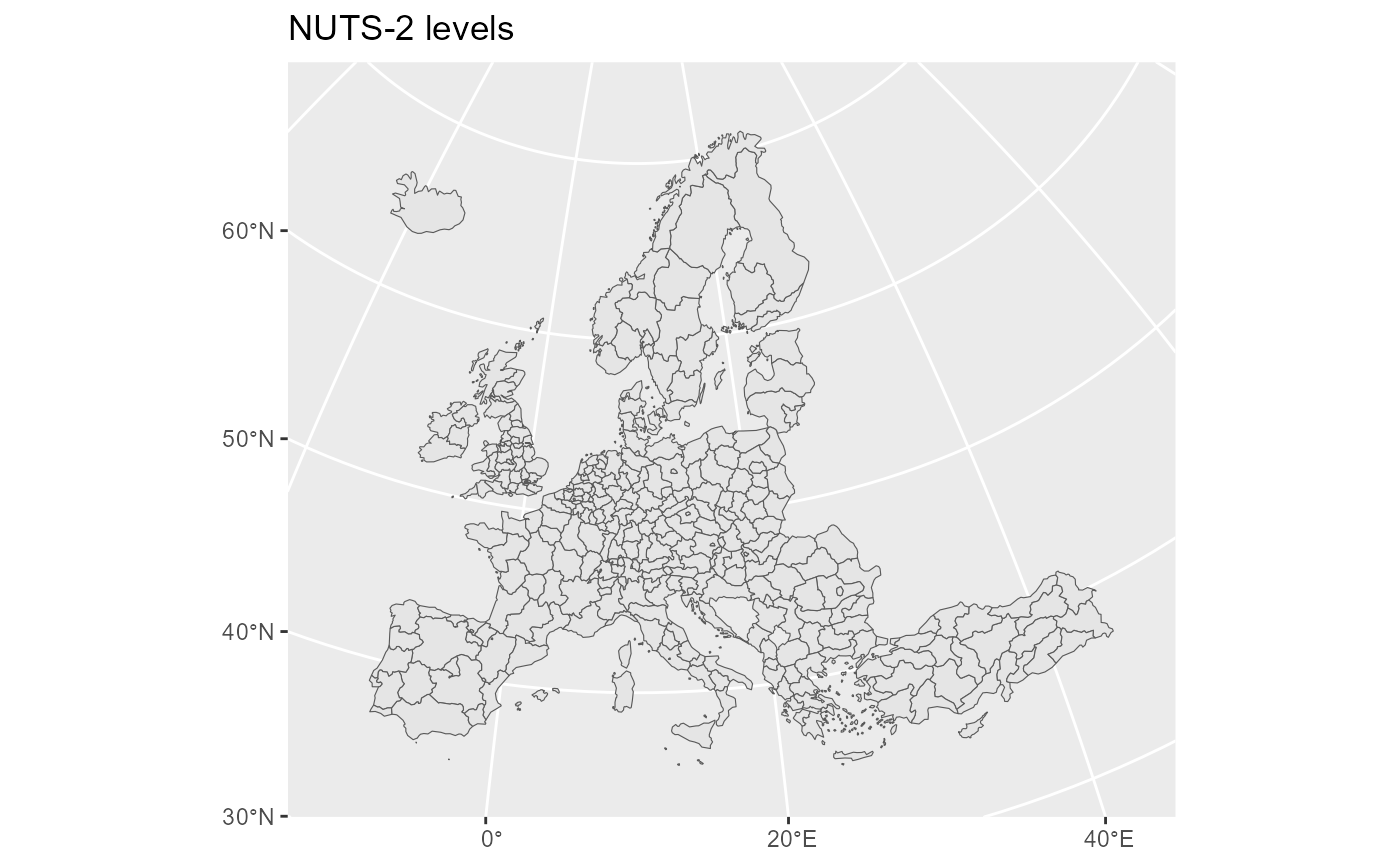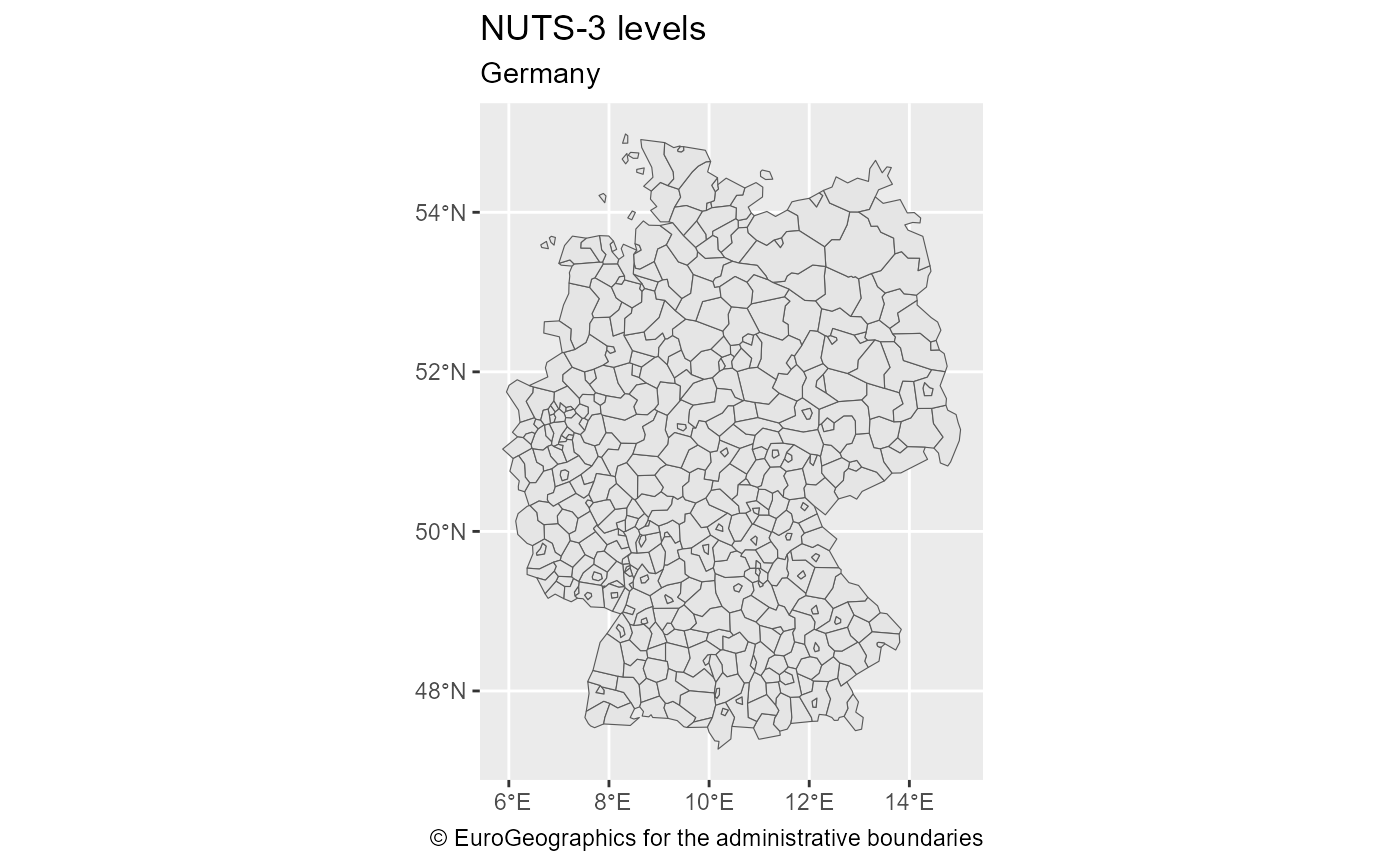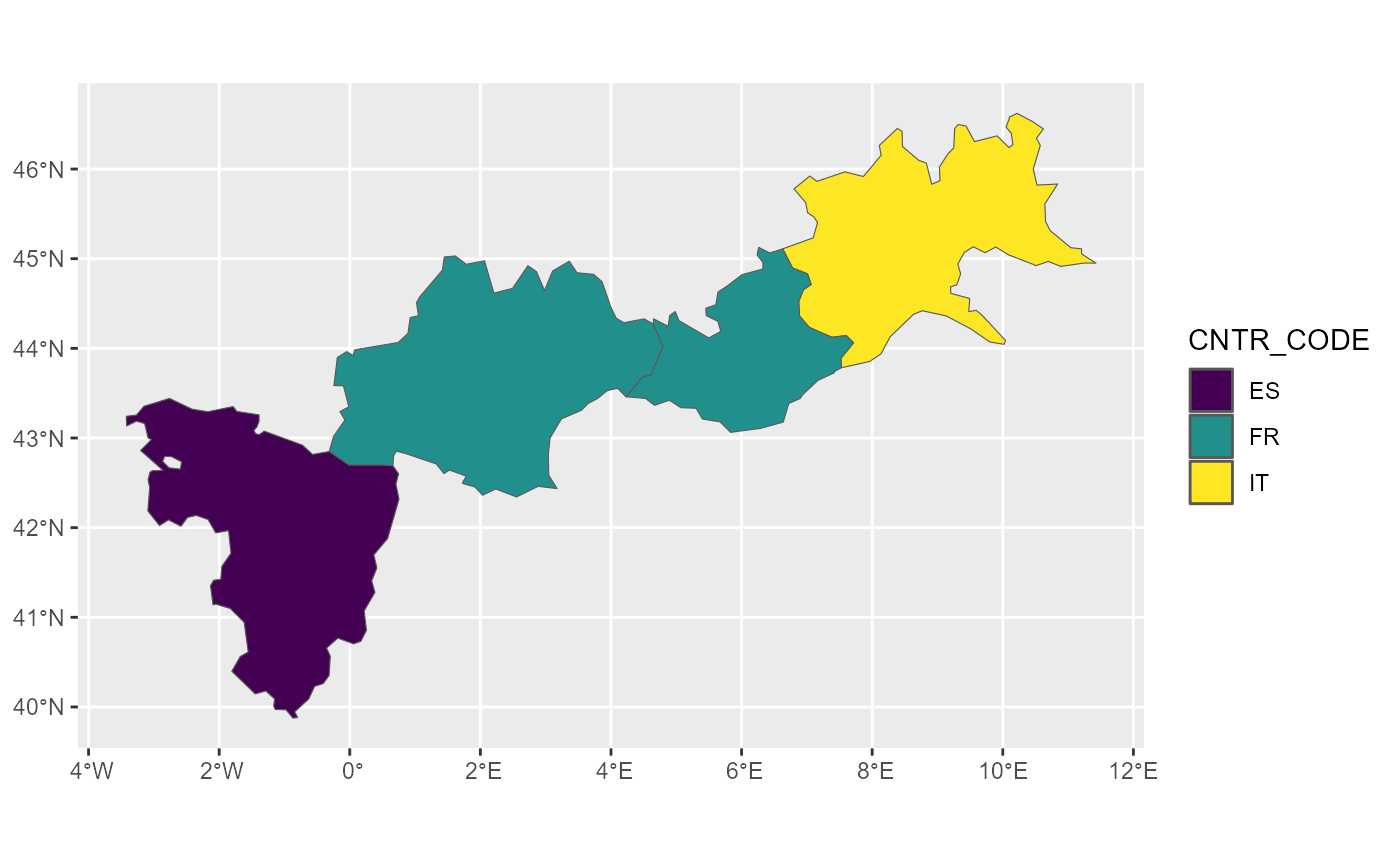The GISCO statistical unit dataset represents the NUTS (nomenclature of territorial units for statistics) and statistical regions by means of multipart polygon, polyline and point topology. The NUTS geographical information is completed by attribute tables and a set of cartographic help lines to better visualise multipart polygonal regions.
The NUTS are a hierarchical system divided into 3 levels:
NUTS 1: major socio-economic regions
NUTS 2: basic regions for the application of regional policies
NUTS 3: small regions for specific diagnoses.
Also, there is a NUTS 0 level, which usually corresponds to the national boundaries.
Please note that this function gets data from the aggregated GISCO
NUTS file, that contains data of all the countries at the requested NUTS
level(s). If you prefer to download individual NUTS files, please use
gisco_get_unit_nuts().
Usage
gisco_get_nuts(
year = 2024,
epsg = 4326,
cache = TRUE,
update_cache = FALSE,
cache_dir = NULL,
verbose = FALSE,
resolution = 20,
spatialtype = "RG",
country = NULL,
nuts_id = NULL,
nuts_level = c("all", "0", "1", "2", "3"),
ext = "gpkg"
)Source
https://gisco-services.ec.europa.eu/distribution/v2/.
Copyright: https://ec.europa.eu/eurostat/web/gisco/geodata/administrative-units.
Arguments
- year
character string or number. Release year of the file. One of
"2024","2021","2016","2013","2010","2006","2003".- epsg
character string or number. Projection of the map: 4-digit EPSG code. One of:
"4326": WGS84."3035": ETRS89 / ETRS-LAEA."3857": Pseudo-Mercator.
- cache
logical. Whether to do caching. Default is
TRUE. See Caching strategies section ingisco_set_cache_dir().- update_cache
logical. Should the cached file be refreshed? Default is
FALSE. When set toTRUEit would force a new download.- cache_dir
character string. A path to a cache directory. See Caching strategies section in
gisco_set_cache_dir().- verbose
logical. If
TRUEdisplays informational messages.- resolution
character string or number. Resolution of the geospatial data. One of:
"60": 1:60 million."20": 1:20 million."10": 1:10 million."03": 1:3 million."01": 1:1 million.
- spatialtype
character string. Type of geometry to be returned. Options available are:
"RG": Regions -MULTIPOLYGON/POLYGONobject."LB": Labels -POINTobject."BN": Boundaries -LINESTRINGobject.
Note that arguments
country,nuts_levelandnuts_idwould be only applied whenspatialtypeis"RG"or"LB".- country
character vector of country codes. It could be either a vector of country names, a vector of ISO3 country codes or a vector of Eurostat country codes. See also
countrycode::countrycode().- nuts_id
Optional. A character vector of NUTS IDs.
- nuts_level
character string. NUTS level. One of
0,1,2,3orallfor all levels.- ext
character. Extension of the file (default
"gpkg"). One of"shp","gpkg","geojson".
Value
A sf object.
Details
The NUTS nomenclature is a hierarchical classification of statistical regions and subdivides the EU economic territory into regions of three different levels (NUTS 1, 2 and 3, moving respectively from larger to smaller territorial units). NUTS 1 is the most aggregated level. An additional Country level (NUTS 0) is also available for countries where the nation at statistical level does not coincide with the administrative boundaries.
The NUTS classification has been officially established through Commission Delegated Regulation 2019/1755. A non-official NUTS-like classification has been defined for the EFTA countries, candidate countries and potential candidates based on a bilateral agreement between Eurostat and the respective statistical agencies.
An introduction to the NUTS classification is available here: https://ec.europa.eu/eurostat/web/nuts/overview.
Note
Please check the download and usage provisions on gisco_attributions().
See also
gisco_nuts_2024, eurostat::get_eurostat_geospatial().
See gisco_bulk_download() to perform a bulk download of datasets.
See gisco_get_unit_nuts() to download single files.
See gisco_id_api_nuts() to download via GISCO ID service API.
Other statistical units datasets:
gisco_get_census(),
gisco_get_coastal_lines(),
gisco_get_lau(),
gisco_get_urban_audit()
Examples
nuts2 <- gisco_get_nuts(nuts_level = 2)
library(ggplot2)
ggplot(nuts2) +
geom_sf() +
# ETRS89 / ETRS-LAEA
coord_sf(
crs = 3035, xlim = c(2377294, 7453440),
ylim = c(1313597, 5628510)
) +
labs(title = "NUTS-2 levels")
 # NUTS-3 for Germany
germany_nuts3 <- gisco_get_nuts(nuts_level = 3, country = "Germany")
ggplot(germany_nuts3) +
geom_sf() +
labs(
title = "NUTS-3 levels",
subtitle = "Germany",
caption = gisco_attributions()
)
# NUTS-3 for Germany
germany_nuts3 <- gisco_get_nuts(nuts_level = 3, country = "Germany")
ggplot(germany_nuts3) +
geom_sf() +
labs(
title = "NUTS-3 levels",
subtitle = "Germany",
caption = gisco_attributions()
)
 # Select specific regions
select_nuts <- gisco_get_nuts(nuts_id = c("ES2", "FRJ", "FRL", "ITC"))
ggplot(select_nuts) +
geom_sf(aes(fill = CNTR_CODE)) +
scale_fill_viridis_d()
# Select specific regions
select_nuts <- gisco_get_nuts(nuts_id = c("ES2", "FRJ", "FRL", "ITC"))
ggplot(select_nuts) +
geom_sf(aes(fill = CNTR_CODE)) +
scale_fill_viridis_d()

